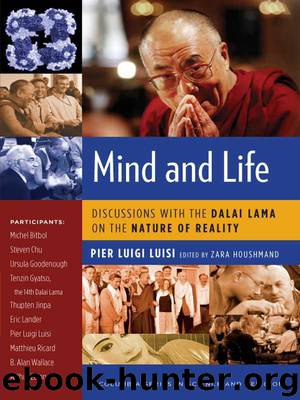Mind and Life: Discussions with the Dalai Lama on the Nature of Reality (Columbia Series in Science and Religion) by Luisi Pier Luigi

Author:Luisi, Pier Luigi [Luisi, Pier Luigi]
Language: eng
Format: azw3
Tags: Religion/General
Publisher: Perseus Books Group
Published: 2010-12-13T02:00:00+00:00
Reflections
As we started moving toward the exit at the end of the session, most of us were absorbed in thought. My own mind was still on Matthieu’s presentation about beginninglessness. At a recent conference I had heard from John Barrow about his concept of the multiverse, a theory that, coming from as far away as string theory, foresees a series of universes originating one from the other,19 an idea put forward also by the astrophysicist Leonard Süsskind.20 These modern theories, which also leave behind the idea of a beginning of the universe, have developed without any link to the Buddhist view of beginninglessness. It is interesting how similar things come from different sources. I was also thinking about the relationship between Matthieu’s notion of beginninglessness and my own talk about the origin of life, the scientific view that foresees a neat beginning of this event. In principle, there was no contradiction between the two, as my scientific notion clearly concerns a “local story,” the story of our planet Earth, a small speck of dust in the universe. Is there no contradiction then between science and Buddhism in this respect? Not quite. My scientific theory of the origin of life implied that life, sentience, and consciousness would derive from the same material basis—that once the structure and self-organization of the cell has appeared, life would originate as an emergent property of this material basis. Moving from the simple first cells to multicellular and eventually to higher organisms, cognition and perception would arise as the sensorium of the organism became more and more sophisticated. At a certain point it would acquire sentience and consciousness. All this comes from within the structure, with no place for any transcendental element. This is not what Buddhism teaches us. We will see more of this contrast in chapter 6, expressly devoted to consciousness.
Download
This site does not store any files on its server. We only index and link to content provided by other sites. Please contact the content providers to delete copyright contents if any and email us, we'll remove relevant links or contents immediately.
| American National Standards Institute (ANSI) Publications | Architecture |
| History | Measurements |
| Patents & Inventions | Research |
Whiskies Galore by Ian Buxton(41995)
Introduction to Aircraft Design (Cambridge Aerospace Series) by John P. Fielding(33122)
Small Unmanned Fixed-wing Aircraft Design by Andrew J. Keane Andras Sobester James P. Scanlan & András Sóbester & James P. Scanlan(32796)
Craft Beer for the Homebrewer by Michael Agnew(18237)
Turbulence by E. J. Noyes(8040)
The Complete Stick Figure Physics Tutorials by Allen Sarah(7366)
The Thirst by Nesbo Jo(6932)
Kaplan MCAT General Chemistry Review by Kaplan(6929)
Bad Blood by John Carreyrou(6612)
Modelling of Convective Heat and Mass Transfer in Rotating Flows by Igor V. Shevchuk(6433)
Learning SQL by Alan Beaulieu(6282)
Weapons of Math Destruction by Cathy O'Neil(6267)
Man-made Catastrophes and Risk Information Concealment by Dmitry Chernov & Didier Sornette(6007)
Digital Minimalism by Cal Newport;(5750)
Life 3.0: Being Human in the Age of Artificial Intelligence by Tegmark Max(5550)
iGen by Jean M. Twenge(5409)
Secrets of Antigravity Propulsion: Tesla, UFOs, and Classified Aerospace Technology by Ph.D. Paul A. Laviolette(5369)
Design of Trajectory Optimization Approach for Space Maneuver Vehicle Skip Entry Problems by Runqi Chai & Al Savvaris & Antonios Tsourdos & Senchun Chai(5066)
Pale Blue Dot by Carl Sagan(4996)
